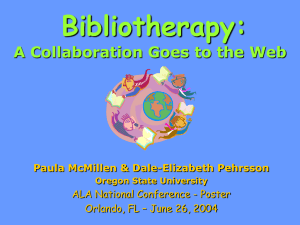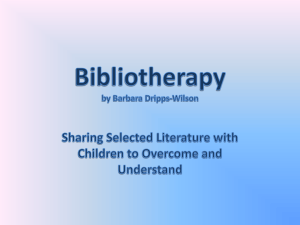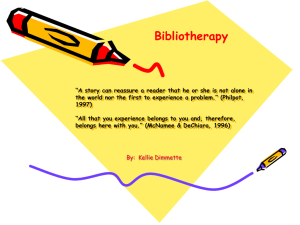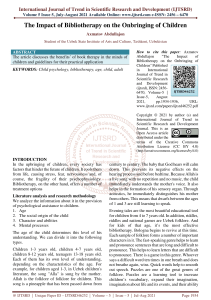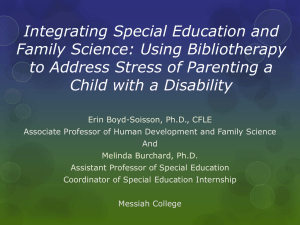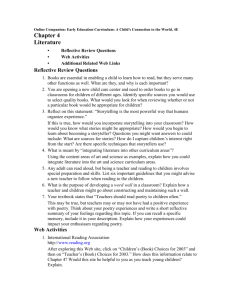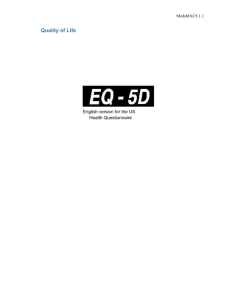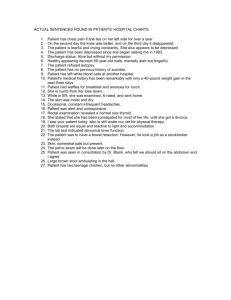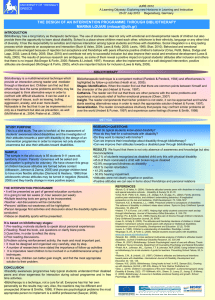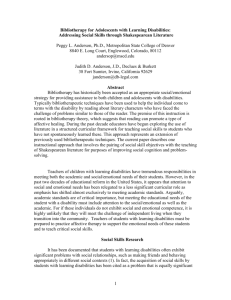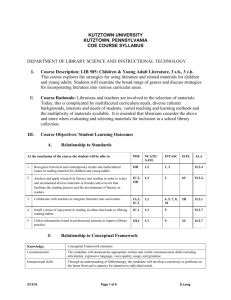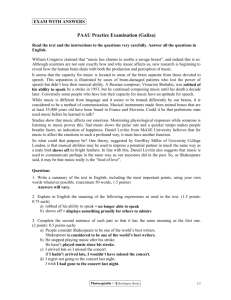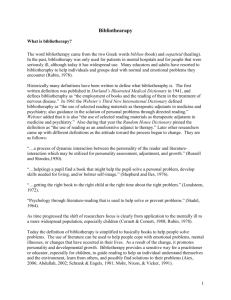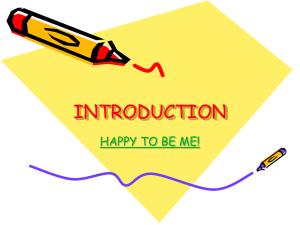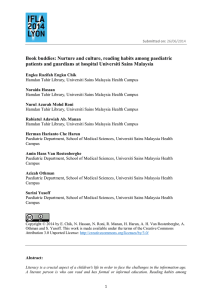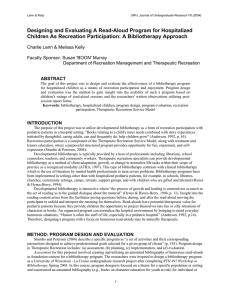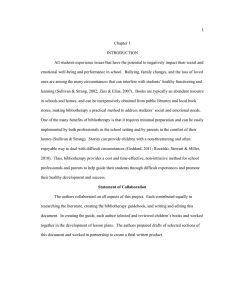PAU Practice Examination (Andalucía)
advertisement
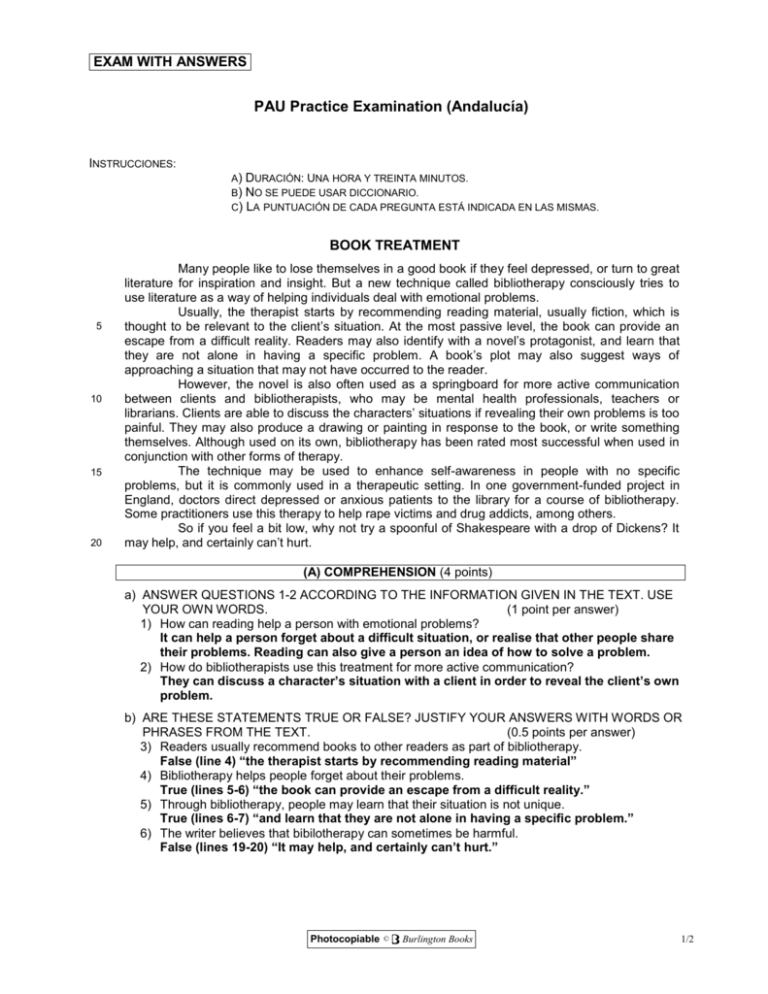
EXAM WITH ANSWERS PAU Practice Examination (Andalucía) INSTRUCCIONES: A) DURACIÓN: UNA HORA Y TREINTA MINUTOS. B) NO SE PUEDE USAR DICCIONARIO. C) LA PUNTUACIÓN DE CADA PREGUNTA ESTÁ INDICADA EN LAS MISMAS. BOOK TREATMENT 5 10 15 20 Many people like to lose themselves in a good book if they feel depressed, or turn to great literature for inspiration and insight. But a new technique called bibliotherapy consciously tries to use literature as a way of helping individuals deal with emotional problems. Usually, the therapist starts by recommending reading material, usually fiction, which is thought to be relevant to the client’s situation. At the most passive level, the book can provide an escape from a difficult reality. Readers may also identify with a novel’s protagonist, and learn that they are not alone in having a specific problem. A book’s plot may also suggest ways of approaching a situation that may not have occurred to the reader. However, the novel is also often used as a springboard for more active communication between clients and bibliotherapists, who may be mental health professionals, teachers or librarians. Clients are able to discuss the characters’ situations if revealing their own problems is too painful. They may also produce a drawing or painting in response to the book, or write something themselves. Although used on its own, bibliotherapy has been rated most successful when used in conjunction with other forms of therapy. The technique may be used to enhance self-awareness in people with no specific problems, but it is commonly used in a therapeutic setting. In one government-funded project in England, doctors direct depressed or anxious patients to the library for a course of bibliotherapy. Some practitioners use this therapy to help rape victims and drug addicts, among others. So if you feel a bit low, why not try a spoonful of Shakespeare with a drop of Dickens? It may help, and certainly can’t hurt. (A) COMPREHENSION (4 points) a) ANSWER QUESTIONS 1-2 ACCORDING TO THE INFORMATION GIVEN IN THE TEXT. USE YOUR OWN WORDS. (1 point per answer) 1) How can reading help a person with emotional problems? It can help a person forget about a difficult situation, or realise that other people share their problems. Reading can also give a person an idea of how to solve a problem. 2) How do bibliotherapists use this treatment for more active communication? They can discuss a character’s situation with a client in order to reveal the client’s own problem. b) ARE THESE STATEMENTS TRUE OR FALSE? JUSTIFY YOUR ANSWERS WITH WORDS OR PHRASES FROM THE TEXT. (0.5 points per answer) 3) Readers usually recommend books to other readers as part of bibliotherapy. False (line 4) “the therapist starts by recommending reading material” 4) Bibliotherapy helps people forget about their problems. True (lines 5-6) “the book can provide an escape from a difficult reality.” 5) Through bibliotherapy, people may learn that their situation is not unique. True (lines 6-7) “and learn that they are not alone in having a specific problem.” 6) The writer believes that bibilotherapy can sometimes be harmful. False (lines 19-20) “It may help, and certainly can’t hurt.” Photocopiable © Burlington Books 1/2 EXAM WITH ANSWERS (B) USE OF ENGLISH (3 points) 7) Give one synonym for RELEVANT (adjective, line 5) (0.25 points) appropriate 8) Find in the text an opposite for GENERAL (adjective) (0.25 points) specific (line 7) 9) Find in the text the word which has the following definition: “talk about ” (verb) (0.25 points) discuss (line 11) 10) Give a noun with the same root as ANXIOUS (adjective, line 17) (0.25 points) anxiety 11) Turn the following sentence into the passive voice. Doctors direct depressed or anxious patients to the library. (0.5 points) Depressed or anxious patients are directed to the library by doctors. 12) Turn the following sentence into reported speech. “In this session, we will discuss a Shakespeare play,” announced the bibliotherapist. (0.5 points) The bibliotherapist announced that in that session, we / they would discuss a Shakespeare play. 13) Give a question for the underlined words. Clients often discuss the book with the therapist. (0.5 points) Who do clients often discuss the book with? 14) Use the words in boxes to make a meaningful sentence. Use all the words and only the words in the boxes without changing their form. (0.5 points) A SOMETIMES BOOK A CLIENTS PICTURE DRAW ABOUT Clients sometimes draw a picture about a book. / Sometimes, clients draw a picture about a book. (C) PRODUCTION (3 points) 15) WRITE A COMPOSITION (80-100 WORDS). CHOOSE ONE OF THE FOLLOWING OPTIONS. SPECIFY YOUR OPTION. a) What kind of books do you prefer reading? Explain why. b) Can watching TV provide the same benefits as reading a book? Answers will vary. PAU Andalucía – Book Treatment Photocopiable © Burlington Books 2/2
